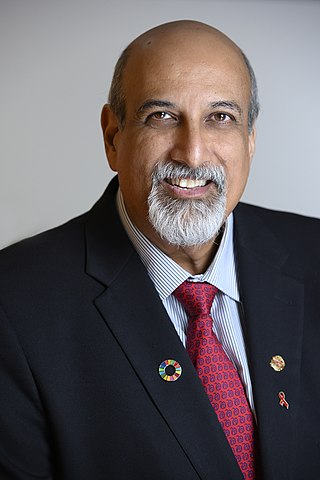Related Research Articles

Donald Ainslie Henderson was an American physician, educator, and epidemiologist who directed a 10-year international effort (1967–1977) that eradicated smallpox throughout the world and launched international childhood vaccination programs. From 1977 to 1990, he was Dean of the Johns Hopkins School of Public Health. Later, he played a leading role in instigating national programs for public health preparedness and response following biological attacks and national disasters. At the time of his death, he was Professor and Dean Emeritus of the Johns Hopkins Bloomberg School of Public Health, and Professor of Medicine and Public Health at the University of Pittsburgh, as well as Distinguished Scholar at the UPMC Center for Health Security.

The Johns Hopkins Bloomberg School of Public Health is the public health graduate school of Johns Hopkins University, a private research university in Baltimore, Maryland. As the second independent, degree-granting institution for research in epidemiology and training in public health, and the largest public health training facility in the United States.

Alfred (Al) Sommer is an American ophthalmologist and epidemiologist at the Johns Hopkins Bloomberg School of Public Health. His research on vitamin A in the 1970s and 1980s revealed that dosing even mildly vitamin A deficient children with an inexpensive, large dose vitamin A capsule twice a year reduces child mortality by as much as 34 percent. The World Bank and the Copenhagen Consensus list vitamin A supplementation as one of the most cost-effective health interventions in the world.

Mary Lou Clements-Mann was the founder and first Director of the Center for Immunization Research at the Johns Hopkins Bloomberg School of Public Health and is well known for her work in the areas of HIV and influenza vaccine research.
Orin Levine is an epidemiologist known for his work in the fields of international public health, child survival, and pneumonia. He is currently the director of vaccine delivery at the Bill & Melinda Gates Foundation in Seattle, US. In the past he was the executive director of the International Vaccine Access Center (IVAC), the co-chair of the Pneumococcal Awareness Council of Experts (PACE), and is a professor at The Johns Hopkins Bloomberg School of Public Health in the Department of International Health. He is also an adjunct assistant professor of epidemiology at The Rollins School of Public Health at Emory University in Atlanta. Additionally, he is currently president of the American Society of Tropical Medicine and Hygiene (ASTMH) Council on Global Health. He resides in Washington, D.C.
Lisa A. Cooper is an American internal medicine and public health physician who is the Bloomberg Distinguished Professor of Equity in Health and Healthcare at Johns Hopkins University, jointly appointed in the Johns Hopkins School of Medicine, Johns Hopkins School of Nursing and in the departments of Health, Behavior and Society, Health Policy and Management; Epidemiology; and International Health in the Johns Hopkins Bloomberg School of Public Health. She is the James F. Fries Professor of Medicine in the Division of General Internal Medicine, Director of the Johns Hopkins Center for Health Equity, and Director of the Johns Hopkins Urban Health Institute. Cooper is also a Gilman Scholar and a core faculty member in the Welch Center for Prevention, Epidemiology, and Clinical Research. She is internationally recognized for her research on the impact of race, ethnicity and gender on the patient-physician relationship and subsequent health disparities. She is a member of the President’s Council of Advisors on Science and Technology (PCAST). In 2007, she received a MacArthur Fellowship.

Salim S. Abdool Karim, MBChB, MMed, MS(Epi), FFPHM, FFPath (Virol), DipData, PhD, DSc(hc), FRS is a South African public health physician, epidemiologist and virologist who has played a leading role in the AIDS and COVID-19 pandemic. His scientific contributions have impacted the landscape of HIV prevention and treatment, saving thousands of lives.
Thomas A. LaVeist is the dean and Weatherhead Presidential Chair at the School of Public Health and Tropical Medicine at Tulane University in New Orleans, Louisiana. He was previously the chairman of the Department of Health Policy and Management at the George Washington University, Milken Institute School of Public Health. He focuses mainly on the development of policy and interventions to address race disparities in the health field.

Dr. Moyses Szklo is a Brazilian epidemiologist and physician scientist. He is currently University Distinguished Service Professor of Epidemiology and Medicine at the Johns Hopkins University, Editor-in-chief Emeritus of the American Journal of Epidemiology, and director of the Johns Hopkins Summer Institute of Epidemiology and Biostatistics. Szklo has published over 300 articles in peer-reviewed journals as well as a major textbook of epidemiology. He has led several major epidemiologic societies and studies and has been lecturing and leading courses all over the world, including Spain, Italy, Israel, Brazil, and Mexico.
Paul Kieran Whelton is an Irish-born American physician and scientist who has contributed to the fields of hypertension and kidney disease epidemiology. He also mentored several public health leaders including the deans of the schools of public health at Johns Hopkins and Columbia. He currently serves as the Show Chwan Health Care System Endowed Chair in Global Public Health and a Clinical Professor in the Department of Epidemiology at the Tulane University School of Public Health and Tropical Medicine. He is the founding director of the Welch Center for Prevention, Epidemiology, and Clinical Research at Johns Hopkins University.
Lawrence J. Appel is the C. David Molina Professor of Medicine and Director of the Welch Center for Prevention, Epidemiology and Clinical Research at Johns Hopkins University, a joint program of the Johns Hopkins University School of Medicine and the Bloomberg School of Public Health. Dr. Appel is a primary care internist who holds a primary appointment in the Department of Medicine with joint appointments in the Department of Epidemiology, International Health, and Nursing. In addition, he directs the ProHealth Clinical Research Unit. The focus of his career is the conduct of clinical, epidemiologic, and translational research pertaining to the prevention and control of high blood pressure, cardiovascular-kidney diseases, and other chronic conditions, primarily through nutrition-based interventions.
David DuPuy Celentano is a noted epidemiologist and professor who has contributed significantly to the promotion of research on HIV/AIDS and other sexually transmitted infections (STIs). He is the Charles Armstrong chair of the Department of Epidemiology at the Johns Hopkins Bloomberg School of Public Health. He holds joint appointments with the school’s departments of Health Policy and Management, Health Behavior and Society, and International Health, and the Johns Hopkins University School of Medicine’s Division of Infectious Diseases.
Leon Gordis was an American epidemiologist, professor and author, whose textbook Epidemiology provided a foundation for the understanding of epidemiologic principles and clinical applications.
Donald S. Burke is an expert on the prevention, diagnosis, and control of infectious diseases of global concern. He is a distinguished University Professor of Health Science and Policy at the University of Pittsburgh.
Adnan A. Hyder is Senior Associate Dean for Research and Professor of Global Health at the George Washington University Milken Institute School of Public Health.
Rexford Sefah Ahima is a professor of medicine, Public Health and Nursing; Bloomberg Distinguished Professor of Diabetes at the Johns Hopkins Medical School; and the Director of the Division of Endocrinology, Diabetes and Metabolism, Johns Hopkins University School of Medicine. Ahima's research focuses on central and peripheral actions of adipocyte hormones in energy homeostasis, and glucose and lipid metabolism.

Gerald T. Keusch is an American physician-scientist and academic administrator. Keusch is the associate provost for global health at Boston University Medical Campus and a professor of international health and medicine at Boston University School of Public Health. He was the director of John E. Fogarty International Center and the associate director of international research at the National Institutes of Health from 1998 to 2003.
Gypsyamber D'Souza is an American epidemiologist. She is a professor of epidemiology at the Johns Hopkins Bloomberg School of Public Health. D'Souza's main focuses of research are infectious diseases, cancer prevention, and translational epidemiology. She is a principal investigator of the Multicenter AIDS Cohort Study / Women's Interagency HIV Study Combined Cohort Study (Mwccs.org).
Thomas C. Quinn is an American physician and infectious disease researcher specializing in the study of HIV/AIDS. He is a professor of medicine and pathology at the Johns Hopkins School of Medicine and director of the Johns Hopkins Center for Global Health. He is also a professor of international health, epidemiology, and molecular microbiology and immunology at the Johns Hopkins School of Public Health and a professor of nursing the Johns Hopkins School of Nursing. In addition, he serves as Associate Director for International Research at the National Institute of Allergy and Infectious Diseases.
Stephen Gange is an American statistician, epidemiologist, and academic administrator of Johns Hopkins University. He is a professor of epidemiology at the Johns Hopkins Bloomberg School of Public Health and has a joint appointment in the Johns Hopkins School of Medicine.
References
- ↑ "Chris Beyrer". Duke. 8 April 2022. Retrieved April 9, 2022.
- 1 2 Chris Beyrer, MD: Professor. Johns Hopkins Bloomberg School of Public Health. Accessed April 2016.
- ↑ "Governing Council". International AIDS Society . Retrieved July 6, 2019.
- 1 2 3 4 5 6 7 8 9 Everitt, Jonathan. "Chris Beyrer's '81 personal encounter with the AIDS epidemic sparks lifelong passion". Hobart and William Smith Colleges. Archived from the original on January 31, 2016. Retrieved January 18, 2016.
- ↑ Hopkins Fogarty AIDS International Training and Research Program: Administration. Johns Hopkins Bloomberg School of Public Health. Accessed April 2016.
- ↑ "Institute of Medicine elects 70 new members, 10 foreign associates". National Academy of Sciences. 20 October 2014. Archived from the original on 30 March 2019.